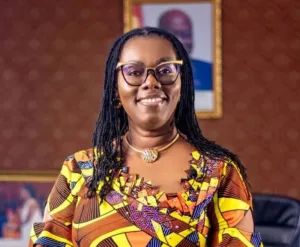Former Minister of Communications and Digitalisation, Ursula Owusu-Ekuful, announced on Monday, 20 October 2025, her intention to contest the party’s General Secretary position ahead of the 2028 general elections.
Owusu-Ekuful, who served as Member of Parliament for Ablekuma West from 2013 until 2025, framed her decision as part of a broader mission to restore unity and public confidence within the NPP. She noted in her birthday‐week statement: “I come to you in all humility, to ask you, dear patriots, to join me on this rescue mission as your next General Secretary.”
According to her announcement, the timing is pivotal. She underscored that the party must reposition itself after recent electoral setbacks and internal divisions, arguing that by December 2028 Ghanaians will expect credible alternatives and renewed leadership. She wrote: “December 2028 is soon upon us … That is why we need to re-shape, re-organise, and put ourselves in a good place to effectively represent the desired change and restore the belief of Ghanaians in us as the institutors of growth and development.”
Owusu-Ekuful’s candidacy highlights her ambition to transition from government service to party administration. The General Secretary role within the NPP is widely regarded as one of the most influential internal positions, overseeing membership records, grassroots mobilisation and the coordination of national party structures. Her entry is likely to intensify the competition for the post.

Observers say her declaration also reflects the party’s evolving internal dynamics. With the NPP facing questions over its organisational coherence and electoral strategy, her campaign may appeal to delegates seeking institutional renewal. Political analysts suggest that her legal background, ministerial experience and high profile place her among the front‐runners.
Owusu-Ekuful’s decision comes as several other candidates have already indicated interest in the General Secretary position, including current office‐holders and former parliamentarians. Her bid therefore enters a field that is expected to be highly contested.
Her record in government is notable: she served as Minister of Communications and Digitalisation from February 2017 until January 2025, contributing to national initiatives on digital infrastructure, rural telephony and internet inclusion. She lost her parliamentary seat in the 2024 elections and has since repositioned her focus on the party’s internal governance.
In her submission, she acknowledged that the party had emerged “bruised, our individual and collective egos battered” and described the current phase as “a necessary phase of self-introspection and diagnosis.” She argued that only through unity and rebuilding from the polling‐station level can the NPP regain its standing.
Her messaging emphasises three main themes: unity, grassroots mobilisation and digital reform. She committed to strengthening party administration, engaging the diaspora and ensuring that basic units are revitalised in time for the 2028 general elections.

Nevertheless, Owusu-Ekuful faces several challenges. Critics point to her ministerial controversies, particularly relating to the SIM card registration exercise and sectoral reforms and question whether she can balance ministerial legacies with party organisational demands. They also note that transitioning from a ministerial role to party administration requires distinct skills. Some party faithful caution that organisational renewal must take precedence over individual ambition.
If elected General Secretary, she would become one of the most senior women to hold the national administrative office within the NPP, an outcome that supporters say could further the party’s drive for gender inclusion in its executive leadership. Her candidacy therefore carries symbolic weight, as much as strategic importance.
For the NPP, the impending race signals more than just a leadership contest. It reflects deeper questions about the party’s direction after nearly a decade in government, its ability to adapt to changing political demographics and its readiness to engage younger voters and digital constituencies. Her campaign platform appears calibrated to address those challenges.
As the party moves towards its next National Conference, the resolution of this contest will provide insight into internal power alignments, delegate priorities and the evolving identity of the NPP. Whether her bid will translate into broad‐based support or ignite further factional rivalry remains to be seen.

